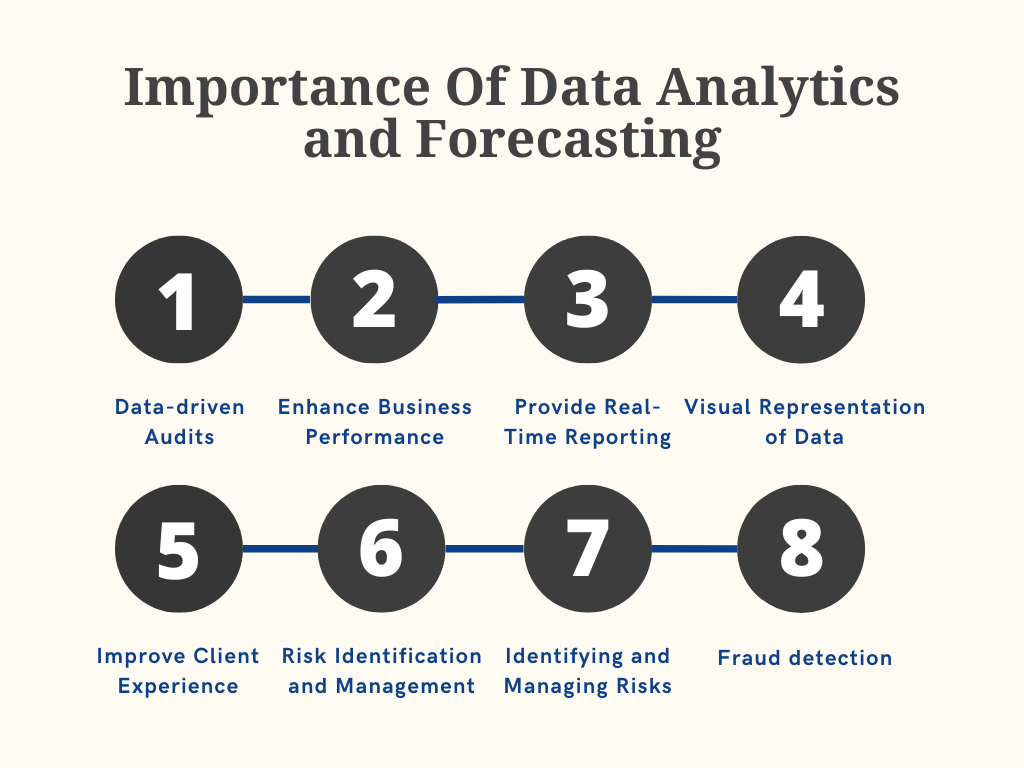Business executives aim to make decisions that benefit the bottom line, allowing their organisations to become more profitable and sustainable over time.
Accountants and other finance experts are critical in assisting business leaders in making these decisions, allowing them to act with confidence and knowledge.
Accounting firm UK help people make better decisions by analysing data, among other things.
Companies now have more access to massive financial data than ever before.
This data can provide valuable business growth or operation opportunities when adequately diagnosed.
With data analytics and forecasting tools, accountants receive meaningful and actionable insights from their financial data.
In accounting, data analytics can help with risk management and identifying process improvements that can boost efficiency.
Here are a few examples of how data analytics and forecasting tools technologies can assist with accounting forecasting.
Table of Content
Importance of Data Analytics and forecasting in the accounting and financial sector

Almost every industry is driven by technology in the ongoing business world. And the accounting sector is no different.
Data analytics with forecasting tools help make effective decisions and satisfy client expectations.

1. Data-driven Audits
Observing how accounting data analytics and forecasting affect auditing is one of the best examples of its impact.
The review of the income statement and balance sheet is no more the extent of auditing.
Additionally, in the past, an auditor may have to check large files for risks manually.
On the other hand, introducing technology and data analytics has transformed auditing.
Using technology, an auditor may now examine many unstructured data, such as emails, formal company records, and more.
2. Enhance Business Performance
It allows to maintain track of the business’s cash flows and determine the process where a company can reduce profits or invest profits.
Data analytics assists in analysing the Cash Flow and transforming the industry.
Data analytics and Forecasting tools help to assess the execution of the company. It allows for setting realistic goals for the business.
It also provides the smooth functioning of the company.
Thus accounting firms must provide enterprises with such critical information for long-term survival.
3. Provide Real-Time Reporting
The introduction of cloud technology and real-time reporting tools has also significantly impacted accounting data analytics and forecasting.
Thanks to data analytics and cloud technology integration, accountants and auditors can now deliver real-time insights to their clients.
They aren’t confined to monthly, quarterly, or annual financial data analysis.
Accountants can now provide quick insights because of data analytics real-time ability.
Even small businesses are attempting to take advantage of the benefits of data analytics in accounting.
According to several companies, small firms may use cloud accounting software to tap into the possibilities of data analytics in accounting.
4. Visual Representation of Data
For a proper understanding of data, there’s the need to present data in easy-to-grasp visual formats.
It could be in the form of graphs or pie charts.
Manually pulling data from numerous sources and putting it together in these graphic formats is difficult. It is especially true when a significant volume of data is involved.
Thus, there’s necessary to implement data analytics and forecasting tools that automatically import data from numerous systems and develop reports at the click of a button. Most advanced techniques even offer real-time analytics views to make some immediate decisions.
5. Improve Client Experience
Data analytics and forecasting importance in accounting goes beyond future strategic planning to include customer relationship optimisation.
Accounting data analysis gives you a thorough picture of a customer’s information, including their family information, bank account information, transaction and inquiry history, and more.
These insights can assist you in having a more in-depth conversation with them, leading to a stronger customer relationship.
You can also build targeted offers for your current clients. It will assist in increasing client loyalty.
Analyse their spending habits or purchasing patterns and partner with well-known merchants to provide rewards. You can also build a premium service for your high-value customers and provide attractive support to encourage them.
6. Risk Identification and Management
Companies must regularly identify and assess the risk variables that affect their business performance.
Mergers and acquisitions, fraudulent operations, supply-chain hazards, and other risks are common in the financial services industry.
Data analytics and forecasting analytics in accounting can greatly enhance risk management by monitoring customer behaviour, predicting shifts in economic patterns, and much more.
Examples of risk management include liquid risk management, credit risk management, card fraud detection, and more.
An accountant, for example, can spot fraudulent purchases and ban the card by studying card transaction patterns, including the amount, timing, location, and other factors.
Data analytics and forecasting can provide comprehensive insights into incoming and outgoing cash flow in the case of liquid risk management.
You can utilise the information to improve liquidity management, which will benefit the financial institution’s overall direction.
Similarly, financial institutions can lower credit risk by looking at transaction histories, publicly available information such as annual reports, and other factors.
They can also develop credit models for individual and corporate customers based on these evaluations and assist them in better managing credit collateral.
The sooner the accountants can identify these risks, the better the chance of mitigating them.
7. Identifying and Managing Risks
Anyone working in a corporation’s accounting department must be able to deal with risk. It can originate from various places, both inside and outside the organisation.
Data analytics technologies can assist in understanding the company’s risk areas, and accounting forecasting can assist in making the best business decisions around certain risks.
8. Fraud detection
While reducing fraud is a specific goal for financial institutions, you may also use analytics to manage risk rather than detect it.
Individual consumers at risk of fraud can be identified and rated using analytics, and You can apply varying levels of monitoring and verification to those accounts.
Financial institutions can determine what to focus on in their fraud detection efforts by analysing the risk of the accounts.
Here are some examples of how financial institutions use analytics to manage demand
1. Personalised marketing
Financial institutions’ key issue is managing the demand side of the equation. By focusing on their most profitable customers, they can profit from a system that offers them access to a customer they might not have had otherwise.
They must know who their best customers are to do this. It is where data analytics can help.
Financial companies now use various data sources to determine who they should target with marketing messages and deals.
2. Lifetime value prediction
The amount of money a client will likely spend with a financial institution over their lifetime is referred to as customer lifetime value (CLV).
It differs from the usual brand value definition, which is the amount of money a client is willing to spend for a product or service.
Financial organisations must consider customer value measures when optimising their business strategies.
Traditional analytics tend to emphasise the former while overlooking the latter, which can substantially influence income.
It’s no surprise that CLV prediction has become one of the essential tools for determining what customers want and need.
3. Recommendation engines
Financial institutions are interested in not only how their current customers utilise their goods but also how to acquire new clients.
They use data analytics and forecasting to create predictive models considering specific client attributes when managing demand.
Credit scores, income levels, and other factors, such as location, can be used to assess consumer behaviour trends. The models show how different parts of the population behave, allowing for more customisation of products and services.
You must carry out these steps without interfering with your client’s experience with your brand.
Instead of focusing solely on how to attract people to buy from you, why not consider how to keep them loyal as well?
4. Business decisions
Business executives may make better growth-oriented decisions using data analytics and forecasting tools since it allows them to control their financial operations completely.
Leaders can develop better short- and long-term financial plans because of real-time data availability.
As a result, data analytics is a trusted advisor to accountants, enabling them to serve their clients better.

Final thoughts
The financial industry in London is one of the most data-intensive industries in the world.
As a result, data analytics and forecasting tools will have a massive impact on accounting.
The information provided above will assist you in comprehending how data analytics tools can help accountants improve their work and contributions toward financial success.
Accounting data analytics software can help you make better company decisions and exceed client expectations.
Accountants and other finance professionals are responsible for obtaining, managing, and analysing data as it becomes more fundamental to corporate financial operations.
Expertise in data analysis and forecasting technologies is essential for financial success.











